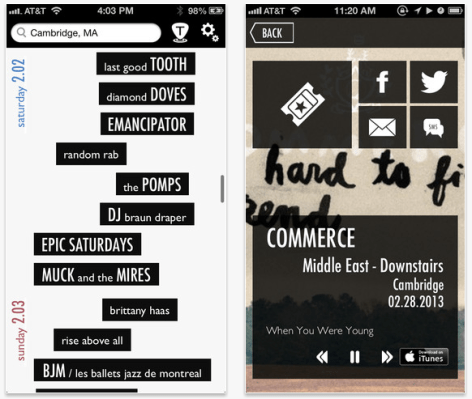Timbre launched last September as a bootstrapped mobile iOS app to help people discover and share live music recommendations in their vicinity. The simple-but-engaging user interface and service proved to be a hit, and within two months, with no spend on media or marketing, it saw more than 100,000 downloads. That attention then brought something else: VCs, who came knocking on the door of Boston-based developer Intrepid. Today, with $360,000 in seed funding from Fred Destin at Atlas, Boston Seed Capital’s Nicole Stata and Bantam Group’s Joe Caruso, Timbre is opening up its app to work beyond the U.S. and in 34 countries, with more features to boot.
Mark Kasdorf, CEO and founder of Intrepid, says that the update today will be the first in a series of upgrades to the app that will be released in the next several months.
For an app with social elements, Timbre stands apart from several others in that it does not require users to log into Facebook, or any other social network, in order to be used. (A user can, however, log in to Facebook and Twitter to more easily share their findings if they so choose.)
This has a double purpose, Kasdorf tells me. It means are more simple onboarding for users — “A three-year-old can use it,” he says. But it also means that Timbre doesn’t have to rely on Facebook’s Graph data to work. The latter is a new, but possibly growing issue for developers: Facebook has started to become more proactive in how it blocks apps that could be seen as direct competitors of its own services, which are expanding, and that has proven to be a nail in the coffin for some.
Still, Kasdorf says it is “inevitable” that longer term it will leverage some of what the Facebook login has to offer. “I don’t think it’s a bad decision to use Facebook logins, but for a number of reasons, it didn’t make sense for us to use it right now,” he says.
What Timbre does use are APIs from Seatgeek to provide ticketing and concert data in the U.S. For the rest of the world, that information is provided via Last.fm’s API. It also uses iTunes’s APIs in different markets to provide preview music links and the option to buy full tracks of songs through Timbre.
Kasdorf notes that there may be more partners added in longer term: today Timbre makes “a little bit of money” on ticketing and affiliate sales of iTunes tracks, and it’s a business that, as user numbers grow, Kasdorf hopes will become a bigger revenue stream.
As for what else might be in the cards, there are some plans for more curated services: “Imagine a group of friends using your app,” he says. “We can help you figure out what to do on a Friday night.” He also notes that Timbre hopes to develop better relationships with bands and labels: “Timbre will be a great way to break bands and songs,” he says.
Intrepid was not seeking funding when the VCs started to approach the developer, and the round was oversubscribed. “People got excited about it, with our early adoption numbers, it wasn’t hard to raise money,” Kasdorf said.
In addition to adding accessibility for 34 countries, the other big update today to Timbre is the addition of curated lists. For example, one list launched today, for the Grammys, lets users tap and listen to nominated music. You can see how this might get used for more services longer term, such as ways to promote festivals. Other updates today include easier options to share what you find, as well as improved ticket purchasing options.
